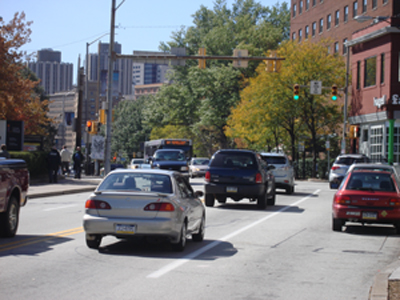Press Release: Smart Traffic Signals Pilot Results: Pollution Plunges, Traffic Clogs Cleared
Air Quality Improvement Brings Economic Benefit
Contact: Ken Walters / 412-268-1151 / walters1@andrew.cmu.edu
 PITTSBURGH—A unique partnership has piloted a new adaptive traffic signal control technology that promises to dramatically reduce harmful vehicle emissions and frustratingly long travel times through urban neighborhoods. With funding support from three Pittsburgh foundations, Carnegie Mellon University has worked with the City of Pittsburgh and East Liberty Development Inc. to deploy the technology for a network of traffic lights serving the busy East Liberty area of the City.
PITTSBURGH—A unique partnership has piloted a new adaptive traffic signal control technology that promises to dramatically reduce harmful vehicle emissions and frustratingly long travel times through urban neighborhoods. With funding support from three Pittsburgh foundations, Carnegie Mellon University has worked with the City of Pittsburgh and East Liberty Development Inc. to deploy the technology for a network of traffic lights serving the busy East Liberty area of the City.
"The reductions of 40 percent in vehicle wait time, nearly 26 percent in travel time and 21 percent in projected vehicle emissions realized in this pilot are remarkable," said Jared L. Cohon, president of Carnegie Mellon. "I’m proud of CMU's team, which developed this first-in-the-world technology, and am equally proud of the partnership approach typical of Pittsburgh that made this pilot possible."
Pittsburgh Mayor Luke Ravenstahl cheered the pilot's success as "a breakthrough in making our city's traffic system work far more efficiently without having to resort to expensive widening roads, eliminating street parking, or re-routing. It makes the city more attractive to employers and residents alike."
Stephen Smith, director of the Intelligent Coordination and Logistics Laboratory in CMU’s Robotics Institute, attacked the tough problem of perennially congested road networks in urban centers. Combining concepts from the fields of artificial intelligence and traffic theory, his team first developed technology to allow traffic signals to communicate with one another and collaboratively adapt to actual traffic conditions in real time. The second step was to establish proof of the concept using a simulation model of Pittsburgh city traffic. The latest step has been the pilot project that has successfully demonstrated that traffic signals have the ability to react to quickly changing conditions, reducing traffic congestion and the resulting extra vehicle emissions. The next step will be to expand the pilot to demonstrate the technology on a bigger scale.
"This type of technological breakthrough is just what we hoped could happen when Traffic21 was created with a broad community partnership led by CMU," said Pittsburgh business leader and philanthropist Henry Hillman. "We are now beginning to see how Pittsburgh can be positioned to be a leading city on an international scale in demonstrating how low-cost, easy-to-implement technological solutions can reduce traffic congestion, vehicle fuel consumption and emissions while also improving safety and air quality."
Heinz Endowments President Robert Vagt noted that each of the parties involved in the pilot is a member of the Breathe Project, the broad-based coalition of 112 organizations and 1,200 individuals dedicated to pulling Pittsburgh into the ranks of the cleanest-air regions in the country. "We saw the adaptive signalization project as a way to reduce the estimated 17 percent of our local air pollution problem [Allegheny County] that comes from vehicle emissions. What we've discovered from this great result is that something done with the intention of improving air quality can also deliver a significant economic benefit."
James Rohr, chairman and CEO of PNC Financial Services Group, a trustee of CMU, a member of the Endowments’ board and the leadership group of the Breathe Project, echoed these sentiments. "We need this kind of innovation to improve our city, improve our air and improve our region's reputation for innovation."
Building on the support of the Traffic21 Initiative, CMU won a national competition in January 2012 to be named a University Transportation Center (UTC) by the U. S. Department of Transportation. Traffic21 and the new Technologies for Safe and Efficient Transportation UTC hope to continue the development and deployment of the smart signals technology breakthrough with its partners, expanding the pilot and assessing the possibilities for introducing the technology throughout the city. Partners in this endeavor will include among others the City of Pittsburgh, Southwestern Pa. Commission, Pennsylvania's Department of Transportation, the Hillman and Richard King Mellon foundations, the Endowments, University of Pittsburgh Medical Center and East Liberty Development.
###
A new adaptive traffic signal control technology that promises to dramatically reduce harmful vehicle emissions and frustratingly long travel times through urban neighborhoods.